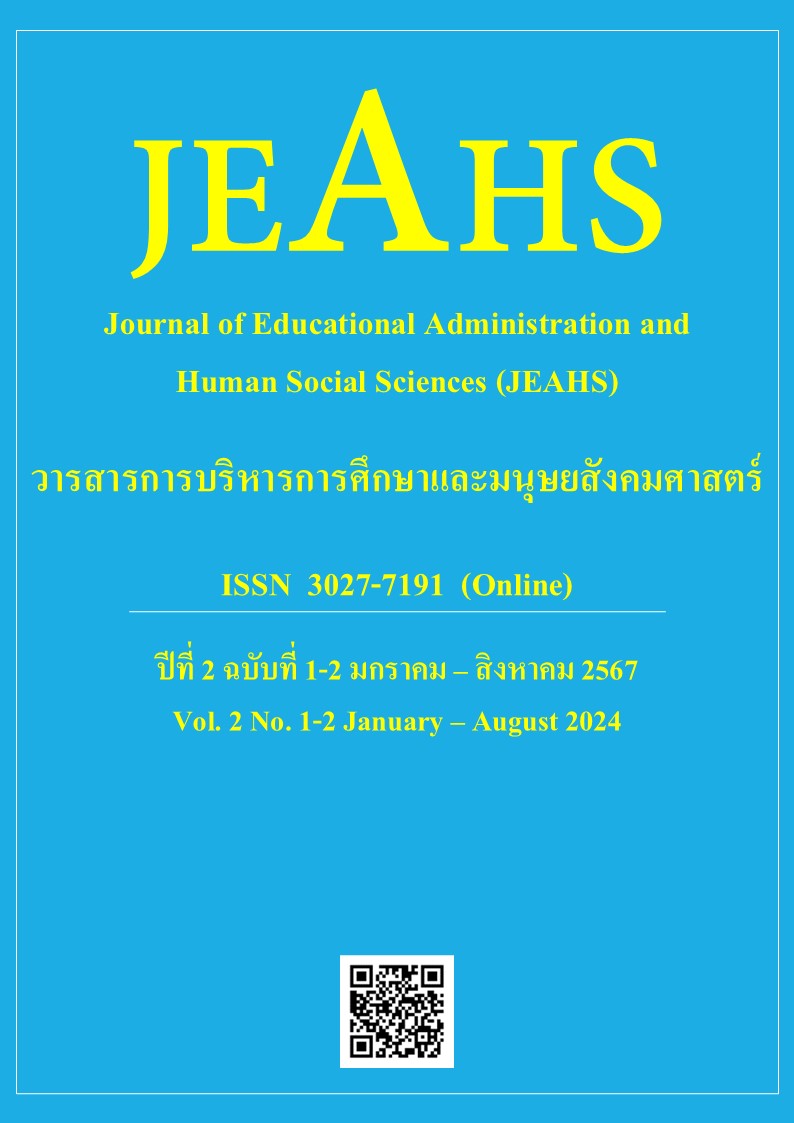การบริหารองค์กรทางการศึกษา
Main Article Content
บทคัดย่อ
การบริหารองค์กรทางการศึกษาเป็นกระบวนการบริหารจัดการศึกษาเพื่อให้โรงเรียนมีคุณภาพ โดยมีเป้าหมายหลักคือการสร้างโอกาสทางการศึกษาให้เด็กและเยาวชนได้รับการศึกษาขั้นพื้นฐานที่มีคุณภาพมาตรฐาน และสอดคล้องกับความต้องการของท้องถิ่น นอกจากนี้ ยังมุ่งเน้นให้โรงเรียนเป็นที่ยอมรับและศรัทธาของนักเรียน ผู้ปกครอง และชุมชน โดยแนวทางการบริหารจัดการโรงเรียนสู่คุณภาพ นับว่าเป็นกลยุทธ์สำคัญที่นำไปสู่ความสำเร็จของเป้าหมายดังกล่าว โดยประกอบด้วยองค์ประกอบหลักดังนี้ 1) หลักการบริหารจัดการ เป็นแนวคิดพื้นฐานที่ชี้นำการดำเนินงานของโรงเรียน เช่น หลักการมีส่วนร่วมของทุกภาคส่วน หลักการมุ่งเน้นผู้เรียนเป็นศูนย์กลาง เป็นต้น 2) วัตถุประสงค์ของโรงเรียน เป็นเป้าหมายที่โรงเรียนต้องการบรรลุ เช่น การพัฒนาผู้เรียนให้มีความรู้ ความสามารถ และคุณธรรม จริยธรรม 3) พันธกิจของโรงเรียน เป็นภารกิจหลักที่โรงเรียนต้องปฏิบัติ เช่น การจัดการเรียนการสอนที่มีคุณภาพ การส่งเสริมพัฒนาศักยภาพของผู้เรียน 4) กลยุทธ์ของโรงเรียน เป็นแผนงานหรือวิธีการที่โรงเรียนจะนำมาใช้เพื่อบรรลุเป้าหมาย เช่น การพัฒนาหลักสูตร การจัดกิจกรรมเสริมหลักสูตร และ 5) เงื่อนไขความสำเร็จ เป็นปัจจัยที่ส่งผลต่อความสำเร็จของการบริหารจัดการโรงเรียน เช่น การสนับสนุนจากผู้บริหาร ครู ผู้ปกครอง และชุมชน สรุปโดยรวมการบริหารองค์กรทางการศึกษาเพื่อการบริหารจัดการโรงเรียนสู่คุณภาพเป็นกระบวนการที่ซับซ้อนและต้องอาศัยความร่วมมือจากทุกภาคส่วน โดยมีเป้าหมายเพื่อพัฒนาคุณภาพชีวิตของผู้เรียนและชุมชนให้ดีขึ้นอย่างยั่งยืน
Article Details

อนุญาตภายใต้เงื่อนไข Creative Commons Attribution-NonCommercial-NoDerivatives 4.0 International License.
บทความที่ส่งมาขอรับการตีพิมพ์ในวารสารวารสารการบริหารการศึกษาและมนุษยสังคมศาสตร์ จะต้องไม่เคยตีพิมพ์หรืออยู่ระหว่างการพิจารณาจากผู้ทรงคุณวุฒิเพื่อตีพิมพ์ในวารสารอื่น รวมทั้งผู้เขียนจะต้องคำนึงถึงจริยธรรมการวิจัย ไม่ละเมิดหรือคัดลอกผลงานของผู้อื่นมาเป็นของตนเอง ซึ่งทางวารสารได้กำหนดความซ้ำของผลงานด้วยโปรแกรม CopyCat เว็บ Thaijo ในระดับ ไม่เกิน 25%
ในกรณีที่ บทความวิจัยมีกระบวนการวิจัยเกี่ยวข้องกับมนุษย์ ผู้นิพนธ์จะต้องส่งหลักฐานการรับรองจริยธรรมการวิจัยในมนุษย์มาประกอบการลงตีพิมพ์ด้วยจึงจะได้รับการพิจารณาลงตีพิมพ์ในวารสาร
ผู้เขียนบทความจะต้องปฏิบัติตามหลักเกณฑ์การเสนอบทความเพื่อตีพิมพ์ในวารสารการบริหารการศึกษาและมนุษยสังคมศาสตร์ รวมทั้งระบบการอ้างอิงต้องเป็นไปตามหลักเกณฑ์ของวารสารการบริหารการศึกษาและมนุษยสังคมศาสตร์ โดยรวมทั้งทัศนะและความคิดเห็นที่ปรากฏในบทความในวารสารการบริหารการศึกษาและมนุษยสังคมศาสตร์ ถือเป็นความรับผิดชอบของผู้เขียนบทความนั้น และไม่ถือเป็นทัศนะและความรับผิดชอบของกองบรรณาธิการวารสารการบริหารการศึกษาและมนุษยสังคมศาสตร์ และวารสารการบริหารการศึกษาและมนุษยสังคมศาสตร์
เอกสารอ้างอิง
กระทรวงศึกษาธิการ. (2545). แนวทางการจัดทำหลักสูตรสถานศึกษา. กรุงเทพมหานคร: คุรุสภาลาดพร้าว.
กระทรวงศึกษาธิการ. (2546). พระราชบัญญัติการศึกษาแห่งชาติ พ.ศ. 2542 และที่แก้ไขเพิ่มเติม (ฉบับที่ 2) พ.ศ. 2545 พร้อมกฎหมายกระทรวงที่เกี่ยวข้องและพระราชบัญญัติการศึกษาภาคบังคับ พ.ศ. 2545. กรุงเทพมหานคร: องค์การรับส่งสินค้าและพัสดุภัณฑ์.
กระทรวงศึกษาธิการ. (2547). สำนักงานคณะกรรมการการศึกษาขั้นพื้นฐาน. กรุงเทพมหานคร: คุรุสภาลาดพร้าว.
ไกรษร แก้วฝ่าย และจุฬาพรรณภรณ์ ธนะแพทย์. (2565). การบูรณาการหลักพุทธธรรมในการบริหารวิชาการสู่ความเป็นเลิศของโรงเรียน. วารสาร มจร อุบลปริทรรศน์. 7(3). 517-528.
ถวัลย์ มาศจรัส. (2546). PDCA: นวัตกรรมการเขียนแผนการจัดการเรียนรู้ โดยเน้นผู้เรียนเป็นสำคัญและการเขียนหนังสือสำหรับครูและผู้บริหาร. กรุงเทพมหานคร: 21 เซ็นจูรี่.
นภดล สุวรรณสุนทร. (2555). การบริหารงานตามหลักพระพุทธศาสนา. แหล่งที่มา http//www.siace.ac.th/index.php?option=com_conten&view=article&id=129 สืบค้นเมื่อ 25 ม.ค. 2566.
ประกอบ คุณารักษ์. (2545). เอกสารประกอบการสอน เรื่อง การบริหารแบบมีส่วนร่วม. นครปฐม: มหาวิทยาลัยศิลปากร.
พระธีรพัฒน์ กุลธีโร และพระมหาเผด็จ จิรกุโล. (2565). กลยุทธ์การจัดการความรู้ทางพระพุทธศาสนากับการบริหารการศึกษา. วารสารบวรสหการศึกษาและมนุษยสังคมศาสตร์. 3(1). 19-31.
พระสมรรถชัย มั่งคำมี. (2552). รูปแบบการจัดองค์กรการปกครองคณะสงฆ์ไทย. วิทยานิพนธ์รัฐประศาสนศาตรมหาบัณฑิต. มหาวิทยาลัยศรีปทุม.
รัตนะ ปัญญาภา. (2557). ศักยภาพทางปัญญาตามหลักพระพุทธศาสนา: แนวคิดหลักสำหรับการบริหารการศึกษา. วารสารครุศาสตร์ปริทรรศน์ คณะครุศาสตร์ มหาวิทยาลัยมหาจุฬาลงกรณราชวิทยาลัย. 1(1). 27-41.
สมคิด พรมจุ้ย และสุพักตร์ พิบูลย์. (2544). การประกันคุณภาพภายในสถานศึกษา. นนทบุรี: จตุพร ดีไซน์.
อุทัย บุญประเสริฐ. (2545). การบริหารจัดการสถานศึกษาโดยใช้โรงเรียนเป็นฐาน. พิมพ์ครั้งที่ 2. กรุงเทพมหานคร: จุฬาลงกรณ์มหาวิทยาลัย.
อุทัย ภู่เจริญ. (2564). การศึกษาสร้างคน คนสร้างประเทศชาติ. วารสารมหาจุฬาคชสาร. 12(1). 25-33.
Manitrub. (2557). แนวคิดในการบริหารจัดการศึกษาระดับโรงเรียน. แหล่งที่มา https://manitrub.wordpress.com/2014/12/15/แนวคิดในการบริหารจัดกา/ สืบค้นเมื่อ 25 ม.ค. 2566.


